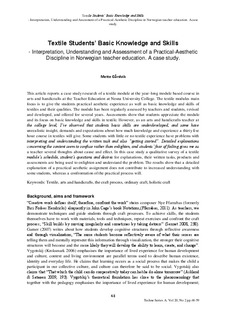Textile Students’ Basic Knowledge and Skills – Interpretation, Understanding and Assessment of a Practical-Aesthetic Discipline in Norwegian teacher education. A case study
Journal article, Peer reviewed
Permanent lenke
http://hdl.handle.net/11250/227636Utgivelsesdato
2013Metadata
Vis full innførselSamlinger
Originalversjon
Gårdvik, M. (2013). Textile students’ basic knowledge and skills – interpretation, understanding and assessment of a practical-aesthetic discipline in Norwegian teacher education. A case study. Techne series: Research in Sloyd Education and Crafts Science A, 20(2), 48-59. Retrieved from https://journals.hioa.no/index.php/techneA/article/view/667/627Sammendrag
This article reports a case study research of a textile module at the year-long module based course in arts and handicrafts at the Teacher Education at Nesna University College. The textile modules main focus is to give the students practical aesthetic experience as well as basic knowledge and skills of textiles and their qualities. The module has been regularly assessed by teachers and students, revised and developed, and offered for several years. Assessments show that students appreciate the module and its focus on basic knowledge and skills in textile. However, as an arts and handicrafts teacher at the college level, I’ve observed that students basic skills are underdeveloped, and some have unrealistic insight, demands and expectations about how much knowledge and experience a thirty five hour course in textiles will give. Some students with little or no textile experience have problems with interpreting and understanding the written task and also “getting started”. Detailed explanations concerning the content seem to confuse rather than enlighten, and students’ fear of failing gives me as a teacher several thoughts about cause and effect. In this case study a qualitative survey of a textile module’s schedule, student’s questions and desires for explanations, their written tasks, products and assessments are being used to enlighten and understand the problem. The results show that a detailed explanation of a practical aesthetic assignment does not contribute to increased understanding with so me students, whereas a confrontation of the practical process will.

